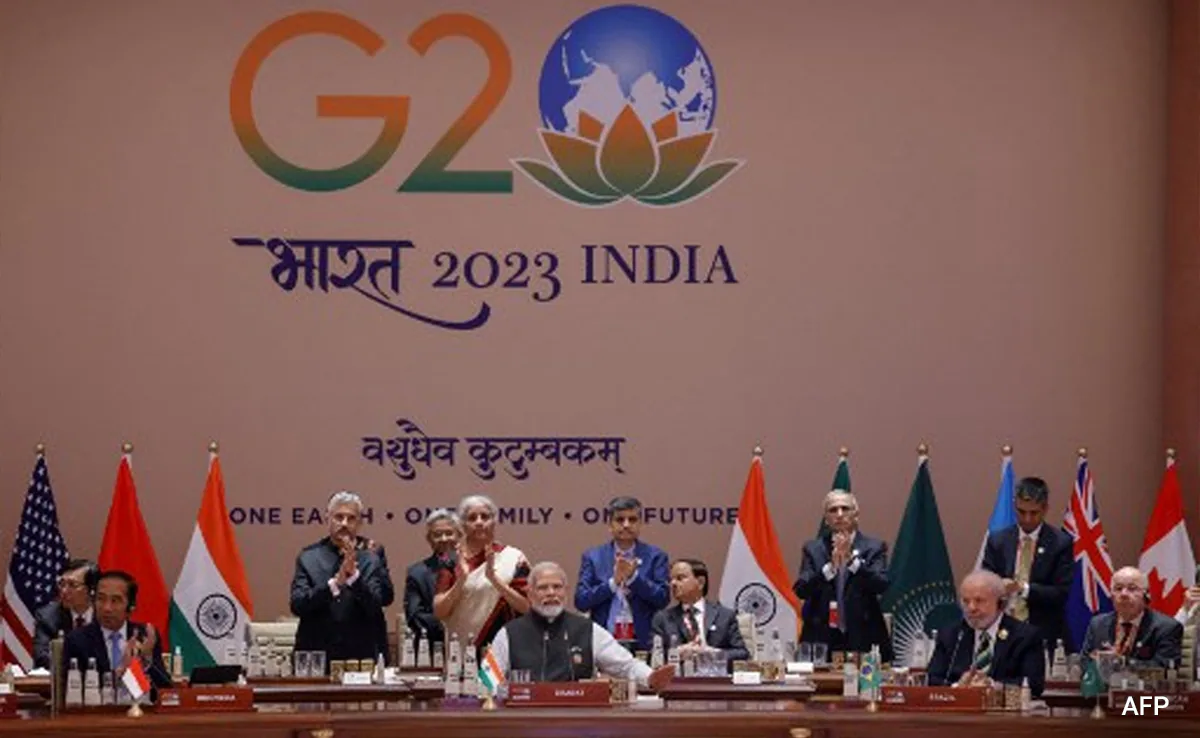
Copyright infringement not intended
Picture Courtesy: www.ndtv.com
Context: The G20 leaders have expressed their commitment to working towards a "fully and well-functioning" dispute settlement system within the World Trade Organization (WTO) by the year 2024. This commitment is a significant development in international trade, as the dispute settlement mechanism of the WTO has faced challenges since the non-functionality of its appellate body in December 2019.
Key points from the G20 declaration related to the WTO dispute settlement mechanism
- The WTO is a Geneva-based international organization with 164 member countries, and it plays a central role in formulating global norms for exports and imports while also serving as a platform for resolving trade disputes among its member states.
- The G20 leaders are emphasizing the need for reform within the WTO to enhance its functionality. They are committed to conducting discussions and pursuing reforms in an inclusive member-driven process. Their goal is to establish a fully operational dispute settlement system that is accessible to all WTO members by 2024.
- The highest decision-making body of the WTO, known as the Thirteenth Ministerial Conference (MC13), is scheduled to convene in Abu Dhabi in February 2024. The G20 leaders are expressing their commitment to work constructively to achieve positive outcomes at this conference.
- The G20 leaders' commitment to revitalize the WTO's dispute settlement system by 2024 is a positive step toward addressing the challenges facing international trade and dispute resolution. The successful functioning of the WTO is seen as crucial for maintaining a stable and predictable global trading system.

Dispute Settlement System of WTO
About
- The WTO was established in 1995 as the successor to the General Agreement on Tariffs and Trade (GATT).
- The Dispute Settlement System is a critical component of the global trade regime. It provides a mechanism for resolving disputes among WTO member countries regarding trade-related issues, ensuring that trade rules are followed and trade disputes are settled through a rules-based system.
- The WTO's dispute settlement mechanism has faced challenges since December 2019 due to a non-functional Appellate Body. This has affected the smooth functioning of the WTO's dispute resolution process.
Key features of the WTO Dispute Settlement System
Two-Tier System
- The two-tier system is a fundamental aspect of the WTO's dispute settlement process. It begins with the establishment of a panel to examine the dispute.
- The panel is composed of experts chosen by the disputing parties or, in the absence of a mutually agreed panel, appointed by the WTO's Director-General. Panel reports serve as the initial rulings on the dispute. Parties can appeal these reports to the Appellate Body, which is a standing body of seven members with expertise in trade law.
- This two-tier approach ensures that disputes are thoroughly examined and that there is an avenue for reviewing panel decisions.
Timelines
- The DSU sets strict timelines for various stages of dispute resolution to ensure that cases are resolved efficiently. These timelines include deadlines for submitting panel requests, panel reports, and appeals to the Appellate Body. Adherence to these timelines is crucial for maintaining the predictability and effectiveness of the dispute settlement process.
Transparency
- Transparency is a key principle of the DSU. It ensures that the dispute resolution process is open and accessible to all interested parties, including WTO member countries and the general public.
- Reports and submissions made during the dispute proceedings are typically made public, allowing stakeholders to follow the progress of the case. This transparency enhances the credibility and accountability of the dispute settlement system.
Binding Decisions
- One of the most significant features of the WTO Dispute Settlement System is that its rulings are binding. When a panel or the Appellate Body issues a report, member countries involved in the dispute are expected to comply with the findings and recommendations. Failure to do so can lead to authorized retaliation or compensation for the aggrieved party.
- This binding nature of decisions promotes the rule of law in international trade and encourages compliance with WTO rules.
Multilateral Nature
- The DSU ensures that trade disputes are resolved through a multilateral process, meaning that they are settled within the framework of the WTO and involve all relevant parties. This fosters the rule of law in international trade and prevents unilateral actions or trade wars.
- It also promotes fairness and equality in dispute resolution, as even smaller and less powerful countries have the opportunity to participate on an equal footing with larger economies.
Significance of the WTO Dispute Settlement System accurately
Rules-Based Trade
- The promotion of a rules-based international trading system is one of the primary objectives of the WTO's dispute settlement mechanism. By providing a structured and rule-bound process for resolving trade disputes, the WTO ensures that trade rules and agreements are upheld and enforced.
- This is essential for fostering stability, predictability, and fairness in global trade. It prevents countries from taking unilateral actions that could disrupt international trade and helps maintain a level of order and discipline in the trading system.
Predictability
- The WTO's dispute settlement system enhances predictability for member countries. It assures them that trade disputes will be resolved impartially based on established rules and legal principles.
- This predictability is vital for businesses and investors, as it reduces the uncertainty and risk associated with international trade. Knowing that trade disputes will be addressed through a transparent and standardized process encourages countries to abide by trade rules and agreements, promoting long-term stability in the global economy.
Avoiding Trade Wars
- An essential function of the WTO's dispute settlement mechanism is its role in preventing trade wars and trade-related conflicts. By providing a platform for countries to resolve disputes peacefully and through legal channels, it offers an alternative to unilateral actions such as imposing tariffs or trade barriers.
- This mechanism reduces the likelihood of escalating trade tensions into full-blown trade wars, which can have detrimental effects on the global economy.
Level Playing Field
- The WTO's dispute settlement system ensures that even smaller and less powerful countries have the opportunity to seek the resolution of trade disputes on an equal footing with larger and more influential economies. This promotes fairness and equity in international trade.
- It prevents mightier nations from using their economic clout to dominate smaller trading partners and reinforces the principle that all WTO members, regardless of their size or economic strength, must abide by the same set of rules.
WTO Dispute Settlement System faces several challenges:
- Appellate Body Crisis: The paralysis of the Appellate Body due to the United States blocking of appointments has been a significant challenge. Without a functioning Appellate Body, the system lacks the ability to issue final rulings, which undermines its credibility and effectiveness in resolving disputes.
- Backlog of Cases: The growing backlog of cases in the dispute settlement system has led to delays in resolving disputes. This backlog not only affects the parties involved but also hampers the overall functioning of the WTO. Timely dispute resolution is essential for the stability of international trade.
- Complexity of Cases: Disputes brought before the WTO have become increasingly complex, involving technical and scientific matters. Resolving these complex disputes demands expertise and resources, this can strain the capacity of the system and make it more challenging to reach satisfactory conclusions.
- Lack of Compliance: Some countries have been slow to implement or ignore WTO rulings altogether. This non-compliance weakens the enforcement mechanisms of the system and undermines the credibility of the WTO and the dispute settlement process.
- Trade Tensions and Protectionism: Growing trade tensions and the adoption of protectionist measures by some member countries have made it difficult to find mutually agreeable solutions to disputes. These tensions strain the rules-based trading system and hinder the resolution of trade conflicts.
- Shift Towards Bilateral and Regional Agreements: The shift away from multilateralism towards bilateral and regional trade agreements has reduced the relevance of the WTO and its dispute settlement system. This shift raises questions about the effectiveness of a global trade organization in today's trade landscape.
- Deadlock in Reform Efforts: Efforts to reform the WTO and its dispute settlement system have faced deadlock due to differing views among member countries on the necessary changes. This has impeded the organization's ability to adapt to new challenges effectively.
- Transparency Concerns: Critics argue that the dispute settlement process lacks transparency, making it difficult for non-governmental organizations and the public to understand and assess the decisions and their implications. Enhanced transparency could improve the system's legitimacy.
- Inclusivity and Developing Countries: Concerns have been raised about whether the dispute settlement system adequately addresses the interests of developing countries. Some argue that the system may disproportionately benefit more powerful economies, potentially exacerbating economic inequalities.
Way Forward to ensure the continued effectiveness of the WTO Dispute Settlement System
Reform the Appellate Body
- The Appellate Body crisis has been a significant issue within the WTO, leading to paralysis in the dispute settlement process. Reforming the Appellate Body by appointing new members or exploring alternative dispute resolution mechanisms is crucial. This would help restore the mechanism's functionality and ensure that disputes can be resolved effectively within the WTO framework.
Strengthen Transparency
- Transparency is essential for maintaining the legitimacy of the WTO's dispute settlement system. Enhancing transparency in dispute resolution proceedings ensures that member countries have a clear understanding of the process, which can help build trust. This can be achieved by making dispute documents more accessible, allowing for third-party participation, and ensuring that proceedings are conducted openly and transparently.
Capacity Building
- Smaller and developing countries often face challenges in participating effectively in WTO dispute settlement proceedings due to resource constraints and limited legal expertise. Providing capacity-building assistance to these countries can level the playing field and enable them to engage more effectively. This could include training programs, legal support, and financial assistance.
Promote Mediation and Negotiation
- Encouraging the use of mediation and negotiation before resorting to formal dispute settlement mechanisms is a proactive approach. It can help prevent disputes from escalating and save time and resources. The WTO can establish guidelines or mechanisms to facilitate mediation and negotiation between disputing parties.
Review DSU Provisions
- The Dispute Settlement Understanding (DSU) governs the dispute settlement process within the WTO. It's essential to periodically review and update DSU provisions to ensure they remain relevant and effective in addressing contemporary trade issues and challenges. This may involve clarifying ambiguous language, adapting to new trade practices, and addressing emerging issues such as digital trade and climate-related disputes.
In addition to these steps, WTO members must engage in constructive dialogue and negotiations to find common ground and build consensus on necessary reforms. The WTO is a member-driven organization, and meaningful reform will require cooperation and willingness to adapt to changing global trade dynamics.
Overall, these proposed steps can contribute to revitalizing and strengthening the WTO Dispute Settlement System, making it more responsive to the needs of its member countries and ensuring that it continues to play a vital role in resolving trade disputes on the global stage.

Must Read Articles:
WTO: https://www.iasgyan.in/daily-current-affairs/wto
|
PRACTICE QUESTION
Q. What is the significance of the World Trade Organisation (WTO) Dispute Settlement System in international trade, and what are the key challenges it faces today? How can the WTO and its member countries chart a way forward to address these challenges and ensure an effective and fair global trade dispute resolution process?
|
https://www.ndtv.com/india-news/g20-summit-in-delhi-fully-functional-wto-dispute-settlement-system-by-2024-g20-leaders-4375860













